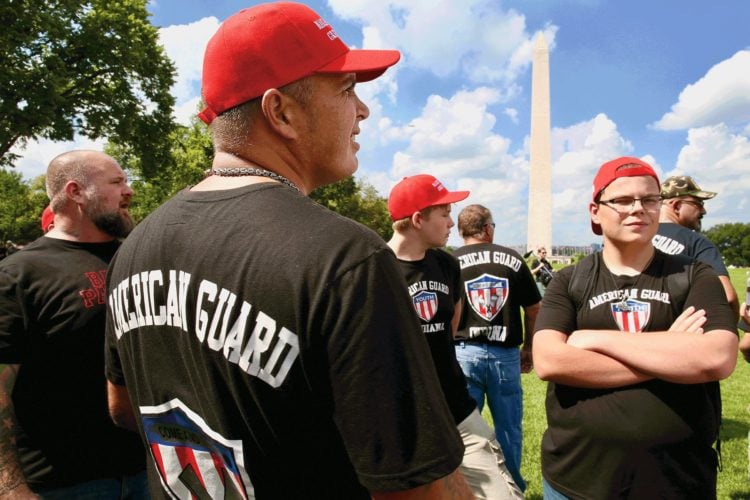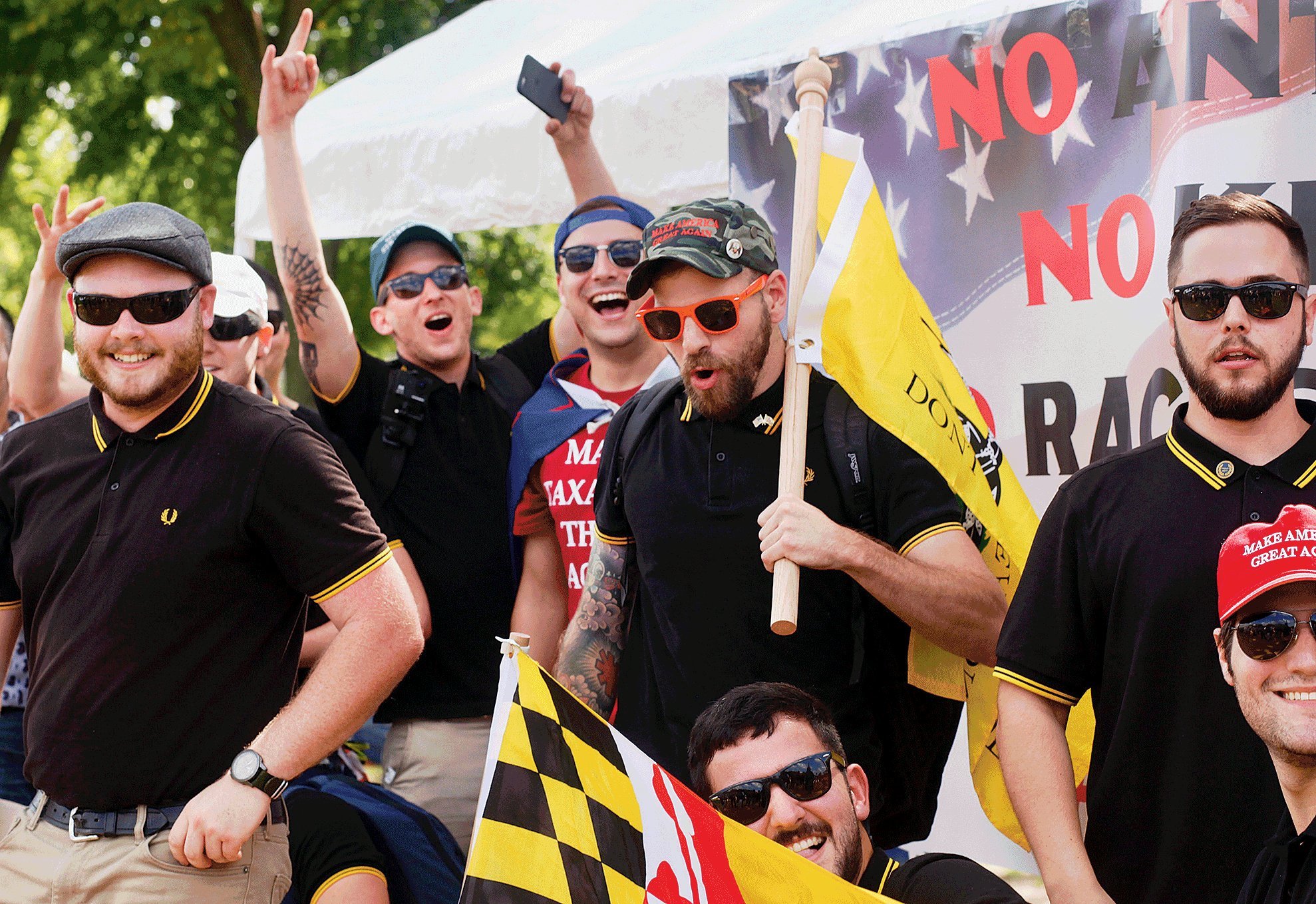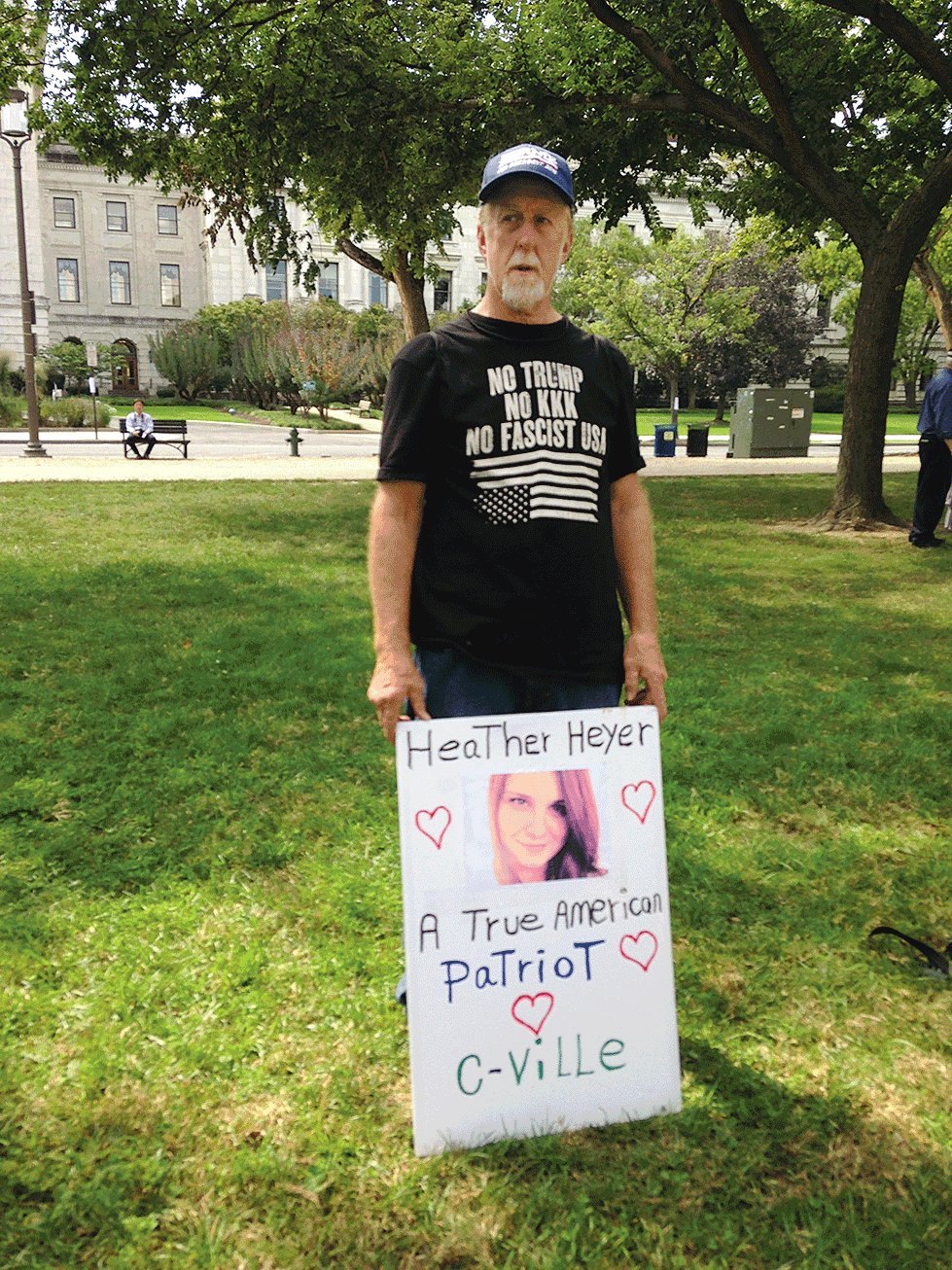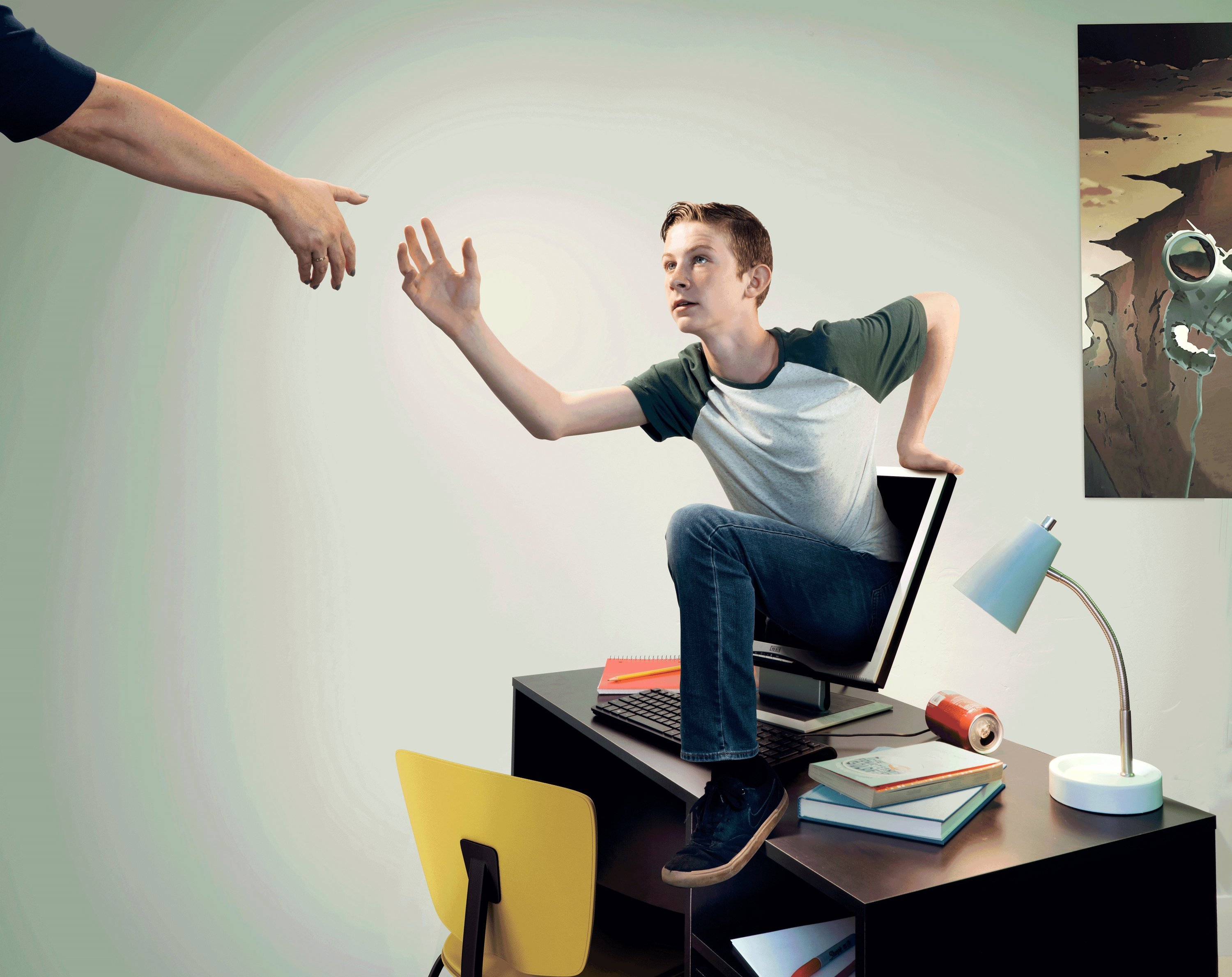Contents
When my son Sam,* who was then 14, asked me to take him to the Mother of All Rallies on the Mall in September 2017, I said no. The pro-Trump event was billed as a demonstration to preserve “traditional American culture,” and white supremacists were expected to show up in force. Not only was this not how I wanted to spend a Saturday—like almost everyone I knew, I’d been devastated by the 2016 election results—but I had serious concerns about safety. At Charlottesville’s Unite the Right rally only a month earlier, a neo-Nazi had killed counterprotester Heather Heyer. I couldn’t shake off the shock of her violent murder, or of watching men with tiki torches shout racist slogans across the University of Virginia grounds. Police there were unable to protect citizens; I couldn’t reasonably expect this gathering in DC to be any different.
Sam knew exactly how I would react to his request. He’d anticipated my automatic veto and readied reasons in favor of attending—not as a participant, he stressed, but as an observer. I can still see him standing in front of me, the longing apparent in his big brown eyes. His favorite school subject was history, he reminded me, and he hungered to witness a genuinely significant event firsthand. As he would tell me later: “I wanted to be part of something big.”
The rally was just a half-hour Metro ride from our home in Washington’s outer suburbs—so he could make the trip alone, he assured me, flashing the transit app on his phone.
His case was well thought out, his explanations admirable. In fact, they were perfectly (too perfectly?) reverse-engineered to match my own values. I’d always preached to him the importance of seeing things for yourself before making a decision, of talking to people individually to understand what motivated them.
Still, I suspected I was being had.
The “Crime”
The problems had started when Sam was 13, barely a month into eighth grade. In the taxonomy of our local public school, his close group of friends was tagged edgy and liberal: One of them came out as gay during a class presentation; another identified as trans for a while. Their group-text chain pulsed 24-7 with observations about alternative music and the robotic conformity of other classmates. Standard stuff for sensitive middle-schoolers.
One morning during first period, a male friend of Sam’s mentioned a meme whose suggestive name was an inside joke between the two of them. Sam laughed. A girl at the table overheard their private conversation, misconstrued it as a sexual reference, and reported it as sexual harassment. Sam’s guidance counselor pulled him out of his next class and accused him of “breaking the law.” Before long, he was in the office of a male administrator who informed him that the exchange was “illegal,” hinted that the police were coming, and delivered him into the custody of the school’s resource officer. At the administrator’s instruction, that man ushered Sam into an empty room, handed him a blank sheet of paper, and instructed him to write a “statement of guilt.”
No one called me as this unfolded, even though Sam cried for about six hours straight as staff members parked him in vacant offices to keep him away from other students. When he stepped off the bus that afternoon and I asked why his eyes were so swollen, he informed me that he would probably be suspended, but possibly also expelled and arrested.
If Kafka were a middle-schooler today, this is the nightmare novel he would have written.
At a meeting two days later with my husband, Sam, and me, the administrator piled more accusations on top of the harassment charge—even implying, with undisguised hostility, that Sam and his friend were gay. He waved in front of us a statement from the girl at the table and insisted that Sam would need to defend himself against her claims if he wanted to prove his innocence. But the administrator refused to reveal the particulars of the complaint (he had also blacked out identifying details, FBI-style) and then hid the paperwork under a book. He declared that it was his primary duty, as a school official and as a father of daughters, to believe and to protect the girls under his care.
The problems started when Sam was 13 and was accused of sexual harassment during first period at school.
In an out-of-body moment, I imagined that this very episode would be cited by some future cultural critic on the limits of liberalism, or perhaps we’d show up in a sociology dissertation about the collision of childhood and technology. Except, coming back to reality, I realized there was nothing theoretical about this. Our son sat pale and trembling as he made his case. I wanted to reach out and hold his hand, but he was at the other end of the large conference table—a raft, it seemed to me, floating unprotected in a stormy sea.
The meeting didn’t go well. My husband walked out after the administrator parsed a line in the county’s code for student conduct in a particularly absurd way, and Sam and I soon followed. Later, from the principal, we learned that school staff had just completed a mandatory training on spotting sexual assault—and the principal acknowledged that perhaps the stress of finishing that course had caused colleagues to overreact.
Sam agreed, reluctantly, to write a letter of apology to the girl who’d reported him so that the debacle would come to an end. But no hoped-for resolution materialized. Instead, Sam’s sweet earnestness, his teenage overconfidence, even his tremulous determination in the face of unjust authority drained away, replaced by . . . nothing. He lost all affect. He stopped eating and sleeping, complained of headaches, and regressed in disturbing ways. He couldn’t concentrate, turned in no homework, and didn’t even pick up a pen when it was time to take a test. One of his extracurricular instructors—a woman who had recently lost a student to suicide—overheard him talking to friends and called me to express concern. He didn’t say much to us, but it seemed obvious enough that he felt betrayed by the adults he’d trusted.
My husband and I felt betrayed, too. We agreed that if we’d lost confidence in the administrators in charge, withdrawing Sam was our only option. We frantically researched private schools with rolling admissions and registered him as soon as he was accepted to one that seemed a good fit. The tuition was a serious stretch, but we believed that because Sam’s well-being was at stake, the situation called for extraordinary measures.
On his last day at the public school, I met Sam at the bus stop, and he reached for a hug in the middle of the empty street. We were both relieved this hideous chapter was closed.
Back to Top
The Metamorphosis
But the transfer, midyear, to a new school—after he’d been wrongly accused, unfairly treated, then unceremoniously dropped by his friends—shattered Sam. He felt totally alone. I counseled patience, naively unprepared for what came next: when he found people to talk to on Reddit and 4chan.
Those online pals were happy to explain that all girls lie—especially about rape. And they had lots more knowledge to impart. They told Sam that Islam is an inherently violent religion and that Jews run global financial networks. (We’re Jewish and don’t know anyone who runs anything, but I guess the evidence was convincing.) They insisted that the wage gap is a fallacy, that feminazis are destroying families, that people need guns to protect themselves from government incursions onto private property. They declared that women who abort their babies should be jailed.
Sam prides himself on questioning conventional wisdom and subjecting claims to intellectual scrutiny. For kids today, that means Googling stuff. One might think these searches would turn up a variety of perspectives, including at least a few compelling counterarguments. One would be wrong. The Google searches flooded his developing brain with endless bias-confirming “proof” to back up whichever specious alt-right standard was being hoisted that week. Each set of results acted like fertilizer sprinkled on weeds: A forest of distortion flourished.
Sam launched a campaign to sway us to his new views. In his mind, he was now an intrepid truth-teller disseminating critical information that mainstream society was invested in keeping under wraps. Challenges to this narrative were to be expected—indeed, they were built into the narrative.
 Photograph by Evy Mages.
Photograph by Evy Mages. Photograph by Evy Mages.
Photograph by Evy Mages. After befriending neo-Nazis on Reddit and 4chan, the author’s son met some of his internet heroes in real life at a 2017 rally on the Mall. Photograph by Evy Mages.
After befriending neo-Nazis on Reddit and 4chan, the author’s son met some of his internet heroes in real life at a 2017 rally on the Mall. Photograph by Evy Mages. An interaction that day with a counterprotester was a turning point in his trip through the alt-right. Photograph courtesy of author.
An interaction that day with a counterprotester was a turning point in his trip through the alt-right. Photograph courtesy of author.Who was living upstairs in the room with the bunk beds, surrounded by glow-in-the-dark solar-system decals? I couldn’t understand how this had happened. The situation was ludicrously overdetermined, as contrived as a bad movie. My husband and I poured everything we had into nurturing an empathetic, observant child. Until then, it had seemed to be working. Teachers and family friends had always commented on Sam’s kindness and especially his gentleness toward the “underdog.” Then an internet chorus of alt-right sirens sings their song of American History X to my kid and he turns into the evil twin of Alex P. Keaton: merciless, intolerant, unwilling to extend the benefit of the doubt to anyone.
The pendulum had swung. And now it was stuck.
I trained myself to freeze my facial expression into something neutral so that when I countered Sam’s remarks—“Feminists keep divorced dads from seeing their kids” was a favorite—it would seem as if I’d actually considered his perspective. I tried to tell myself that at least he was talking to me. And at least he cared about something again; he was animated and engaged.
I did try to clear my own mind enough to understand some situations as he did, such as his belief that the men’s-rights movement restored justice to the world. Sam pledged fealty to the idea of men’s rights because, as he said, his former administrator had privileged girls’ words and experiences over boys’, and that’s how all of his troubles had started in the first place. I’d never in my life backed the “masculinist” cause or imagined that men needed protecting—yet I couldn’t help but agree with Sam’s analysis.
These moments where Sam and I found common ground became increasingly rare, though. Although he had legitimate reasons to feel aggrieved, it was impossible for him to make sense of his situation or to trust that time would heal the hurt. The chasm between us grew. Head down, eyes averted, he trudged straight to his room after school, responded that he wasn’t hungry when I called him down for dinner, and went to bed without saying goodnight.
Back to Top
Meme-World
Soon Sam stopped trying to convince me to join his brave new world. He was so active on his favorite subreddit that the other group leaders, unaware that he was 13, appointed him a moderator. Among his new online besties, this was a huge honor and a boost to his cratered self-esteem. He loved Reddit and its unceasing conversations about the nuances of memes—he seemed in love with the whole enterprise, as if it were an adolescent crush.
But as Sam became a courtier among Reddit royalty, it became clear that meme-world was subject to a hierarchy as rigid and byzantine as England’s class system. If users didn’t follow the rules, they got humiliated publicly. The worst offenders were people who posted “normie” memes—pictures with upper-case slogans across the top and bottom. My husband and I started to hear a lot about normies, “normie culture,” and how normies were ruining the internet and destroying what they (meme insiders?) worked so hard to achieve. Sam and his fellow Redditors used language that was often violently hostile: Not only did normies have no right to dare participate in meme-world; they had no right to live. Literally.
I read later in the Daily Beast that normies are “agreeable, mainstream members of society” and that when they try to get in on the joke, “the joke is ruined forever.” Ergo, clueless normies who put their own spin on your brilliant memes deserve to die. Or something like that.
It all seemed, to a presumed normie such as me, rather . . . unhinged.
Still, the mods invited Sam to a local Meetup—and because I’d read somewhere that your child’s internet activity is constructive if online connections cross over into IRL pals, I was actually happy for him. Friend-making at the new school was slow going; Sam never had plans on the weekend. So this Reddit thing was borderline obsessive and some of the people seemed deeply disturbed, but maybe it would turn out okay after all?
“I liked them because they were adults and they thought I was an adult. They took me seriously.”
Then the mods’ conversation about smoking weed at the Meetup became explicit rather than allusive. Sam confessed and said he knew he couldn’t go.
Predictably, other problems stacked up. The top moderators aimed to approve 100 posts a day, and Sam took it as seriously as a paying job. (The ever-present fear of being called out serves the internet culture well.) His grades suffered, he sacrificed sleep, and stress blackened his mood. When he did talk to us, he fixated on topics like hacking and doxxing.
On top of all this, Sam’s far-right views threatened to alienate teachers and classmates at his new school. But when I begged him to keep his politics to himself so people could get to know him, he accused me of trying to censor him.
Over time, my husband and I started to suspect that Sam’s musings on doxxing and other dark arts might not be theoretical. One weekend morning as we were folding laundry in our room, Sam sat on the edge of our bed and instructed us on how to behave if the FBI ever appeared at our door.
What was posturing and what was real? We suspected the former and doubted the latter, but we had no way to be sure. The situation evolved faster than we could frame the questions, much less figure out the answers. When we did confront Sam—say, if we caught a glimpse of a vile meme on his phone—he assured us that it was meant to be funny and that we didn’t get it. It was either “post-ironic” or referenced multiple other events that created a maze-like series of in-jokes impossible for us to follow.
Eventually, Sam had to give up moderating for the most practical of reasons: Eighth grade ended and he was packing for sleep-away camp. He would be offline for a month and would need other mods to cover for him. To ask for help, he had to out himself as a kid.
Sam and I both laughed about the absurdity of the situation, though he admitted he was nervous he’d be exiled from moderating. I asked him to read me the responses to his message. They were all of the “Dude, you’ve got to be kidding me” variety—one of their most sophisticated and reliable colleagues was a middle-schooler heading off to Jewish summer camp!
Later, it was my turn to be surprised: They all contributed to a going-away gift for Sam and mailed an emoji-themed fidget-spinner to his bunk address.
Back to Top
Caller, You’re on the Air
My husband and I hoped the digital detox would dampen Sam’s passions, but after that summer his bromance with the alt-right heated up again. He consumed Reddit/4chan/YouTube content even more voraciously. We’d hear about someone who was a cuck (as Sam’s friends understood it, a liberal man with sexual and other inadequacies). Or an SJW (social-justice warrior, sneering tone of voice implied). Or a Kek (someone associated with Kekistan, a fake country of right-wing and libertarian citizens who battle liberals, though the term has a much more complicated origin and its definition has morphed over time). A new lexicon was to be learned if we wanted to engage with our son, and it was transforming as fast as the trolls could type—because once the normies caught on, the alt-right torched its terms and rolled out something new.
Despite occasionally declaring that I was finished, forever, discussing Hillary Clinton’s alleged crimes, the Second Amendment, or the video of the girl screaming “Sexual harassment!” at the security guard even though he’d simply asked her to leave the lobby of an office building, Sam produced endless evidence via Google to validate his new beliefs.
A new lexicon was to be learned if we wanted to engage with our son, and it was transforming as fast as the trolls could type.
He seemed excited—proud, even—to teach us something after so many years of having to digest information we’d fed him. He reminded me of one of my brothers, who in his own early teenage years stayed up late to call in to talk-radio shows. On the air, no one knew he was 14. People took him as seriously as they would any late-night caller. Reddit was Sam’s call-in show, the place where he could role-play being an adult.
My husband and I countered all of Sam’s off-kilter theories with data and introduced him to people whose views might outweigh ours. We also took him to movies, signed him up for rock climbing, bribed him to play with his baby cousins, and insisted he continue to join us at the dinner table. We flat-out begged him to go on hikes, bike rides, and even trips to the grocery store with us—anything to extract him from the echo chamber. The most insignificant outings were preceded by Camp David–level negotiations. Most of the time, we lost.
So when Sam asked—not just once but over and over—to go to the Mother of All Rallies, I eventually relented. After the catastrophe in Charlottesville, I certainly wasn’t going to let him go alone. Anyway, it was a chance to spend the day together. It had been ages since we’d done that.
Back to Top
M.O.A.R.
The morning of the rally, Sam and I arrived at the Washington Monument around 8:30—more than an hour early because Sam has always been anxious about getting to places on time. We sat on a marble bench and people-watched as rally-goers gradually filled in the plaza. When a black-clad protester with a black bandanna tied under his eyes slinked past, Sam whispered, “Look, it’s Antifa!”—as if he’d spotted a rare species in the wild. He hurried over to ask if the man would talk for a minute, but the Antifa guy spit out a gruff no and turned away.
All of a sudden, a dozen or so reporters and camera operators noticed a man marching around with a huge Nazi flag that trailed behind him, aloft, like a cape. They started running—actually running—after him. The guy with the Nazi flag kept walking but slowed his pace to let them catch up, then turned around to face the cameras at exactly the moment they were upon him. The choreography was as precise as a ballet.
For the next ten minutes or so, the reporters filmed the Nazi. When they finally turned away from each other, each side seemed happy, shaking hands, nodding enthusiastically, and smiling their thanks. It was the most nakedly symbiotic transaction I’d ever witnessed. The reporters and the Nazi needed each other. There was no meaning—no job—for one without the other. I glanced over at Sam, who was taking it all in.
Over time, my husband and I started to suspect that Sam’s musings on doxxing and other dark arts might not be theoretical.
“Did you see that?” I asked, too overwhelmed to offer my gloss on the situation. I was prepared to let it go if he hadn’t interpreted it as I had.
“Yeah,” he answered. Even though that was all he said, his eyes were shining and I could see he was filing away the encounter.
As we made our way to the makeshift stage for speakers—adjacent to the portable booths of hawkers promoting their ideologies alongside their hats, patches, and posters—Sam decided he wanted to interview as many people as he could. During the next hour and a half, he approached anti-fascist demonstrators, heavily accessorized neo-Nazis, a man draped in the green Kek banner, and a guy who claimed to work for a Republican senator. He recorded the conversations with his phone while I stood a few feet away. He usually asked one question—“Why are you here today?”—and let the person speak until he (they were all men) was finished.
Then Sam’s head would swivel to find me in the crowd. As he debriefed me, he spoke almost as if he were seeing the reverse negative of the person he’d been taping. One neo-Nazi in his early twenties was “internally inconsistent,” Sam said, because he was wearing an Iron Cross as well as an Anarchy pin, and, as Sam informed me, those two philosophies could never coexist. Plus the guy was almost totally incoherent, rambling on about how liberals were keeping him from doing what he wanted, without being able to name a single thing he’d been prevented from doing. In fact, he’d traveled here all the way from the Midwest, just because he’d wanted to. To Sam, who was still fully, unhappily accountable to a slew of adults, that guy had the ultimate freedom—he was just looking for things to complain about.

As for the Kek patriot—well, because Kekistan is an imaginary place, the fact that an adult had created a uniform and a flag for a fake state, then marched around in the dust like a toy soldier, seemed to Sam a ridiculous waste of time. After all, he knew what actual fatigues looked like, thanks to our family’s active-duty military friends. He knew that real service members shipped off to lengthy deployments where they faced serious enemies and life-threatening risks.
So here they were, the star players from Reddit and 4chan, reconstituted in human form on the Mall, and none were as convincing, witty, or transgressive as they had presented themselves online. Even Sam’s biggest Reddit hero—an African American Nazi who posed with him for a selfie—wasn’t as personable as he’d expected.
Toward the end of our walk down the Mall, I spotted a middle-aged man wearing a T-shirt that proclaimed NO TRUMP. NO KKK. NO FASCIST USA. He stood alone on the grass, holding a small poster that featured a picture of a smiling Heather Heyer, the demonstrator murdered in Charlottesville. He’d magic-markered the words A TRUE AMERICAN PATRIOT and c-ville under her photo, above a hand-drawn heart. I asked if I could take his picture, but it was hard to choke out the words because I started crying.
I called Sam over and told him, in front of the man, that standing up for your beliefs among such a large, unfriendly crowd is the definition of courage. Sam seemed to understand. I could tell by the way he shook hands with the man—slowly and deliberately, as if they were each transferring something to the other.
As we walked to the Metro, I thanked Sam for convincing me to go to the rally so I could be reminded what real bravery looks like. “I never would have believed someone could have the guts to stand alone like that, here of all places,” I told him. “I’m so glad I saw it for myself.”
“That’s what you always tell me to do,” Sam said.
Back to Top
The Awakening
In the months that followed, Sam very gradually began to act like the kid he had been before he was falsely accused of sexual harassment. He texted more with classmates than with online strangers, and every few weekends I drove him to sleepovers with other kids. I noticed that when his new group of friends said goodbye to each other, even the boys hugged.
He joined a club. This was a major milestone—he’d never been in a club before.
He watched season after season of The Office with his sister as he used to, and they laughed so hard my husband and I could hear them across the house.
His grades improved. He made eye contact. He joked and sang and volunteered to take out the trash before I even asked.
As for me?
I was shell-shocked—glad the crisis was over but struggling to come to terms with what had transpired.
My cousin, one of the few people I had confided in, suggested that I read Kill All Normies, in which the writer Angela Nagle tracks the rise of the online alt-right during exactly the period Sam fell under its spell. Opening the book was like discovering a diary I could have written myself. Once I started reading about the alt-right, I couldn’t stop. I understood, at last, that the precise circumstances of the online alt-right’s successful wooing of Sam at the height of his vulnerability were unique but that a similar story was playing out in adolescent bedrooms across America. The most horrifying example, of course, was Dylann Roof, the white supremacist who massacred nine African American parishioners in Charleston. Roof has said he became “racially aware” as a teenager after Googling statistics about “black on white” violence. Our family’s circumstances couldn’t be more dramatically different than Roof’s. But if Sam had been drawn into the alt-right, it was open season on any kid with an internet connection.
I began to see how white supremacists have been benefiting from what the writer Carole Cadwalladr has called the “circular knowledge economy”—how search algorithms feed an internet so ravenous for content that facts are optional. But worse, I discovered how expertly extremists have leveraged the web to prey on young people who are depressed. Search for the term “depression” on YouTube, and the professional-looking white supremacists lecturing on self-empowerment might have you nodding in agreement, too.
“There NEED to be public warnings about this,” said Twitter user @MrHappyDieHappy, in one piece I read. “ ‘Online pals’ have attempted to groom me multiple times when at my absolute lowest.”
Back to Top
The Reckoning
One night last fall, I left a stack of these articles on Sam’s bed when he wasn’t around. The story about how the alt-right purposely recruits depressed kids was on top. I walked back to my room, propped myself up in bed, and started catching up on e-mails.
Before long, Sam was at my door.
Then he was curled up next to me.
“Did you hate me when I was hostage to the cult?” he asked. I’d never heard him use that phrase before.
“I didn’t hate you,” I said after a minute. I sensed this was a test, and if I passed, something important was waiting for me. “I was just baffled.”
“I hated myself,” he admitted. “I felt trapped. And now I feel so stupid.” He started sobbing, raggedly, struggling to catch his breath. “Why would adults want to do that? Why would they want to fool kids? How could I fall for it?”
I explained that he’d been a pawn in a much larger game. At age 13, suddenly friendless, he couldn’t be expected to understand how he was being manipulated or how technology made it easier for the online alt-right to find him.
We talked about it every day for the next few weeks. He helped me understand how his anger and confusion over being falsely accused had fueled everything that happened next.
But one mystery remained. I asked him, point-blank, why he’d finally broken from the online alt-right.
“I’d always had my doubts,” he said, as if it were the most obvious thing in the world. “I knew liking them was wrong. But I wanted to like them because everyone else hated them.”
“But did you actually like them?” I asked.
“I liked them because they were adults and they thought I was an adult. I was one of them,” he said. “I was participating in a conversation. They took me seriously. No one ever took me seriously—not you, not my teachers, no one. If I expressed an opinion, you thought I was just a dumbass kid trying to find my voice. I already had my voice.”
I had no idea he’d felt that way. I couldn’t think of anything to say.
“All I wanted was for people to take me seriously,” he repeated matter-of-factly. “They treated me like a rational human being, and they never laughed at me. I saw the way you and Dad looked at each other and tried not to smile when I said something. I could hear you both in your room at night, laughing at me.”
I struggled for a moment because I wanted to tell him that wasn’t true. But I couldn’t deny his accusation. Behind closed doors, when my husband and I thought our children were asleep, we had often vented to each other about Sam’s off-the-wall proclamations and the bizarre situation we found ourselves in.
So I told Sam simply that I was sorry for making him feel bad.
I still think about his words a lot, especially when alt-right figures headline the news. But mostly, I wonder how I could have tried so hard to parent Sam through this crisis and yet tripped up on something as basic as not making my own kid feel small.
Thankfully, Sam moved on. By the fall of tenth grade, he seemed at peace for the first time since he’d stepped off the bus almost two years earlier, face puffy from crying, to inform me he’d broken the law.
That’s why my fears came roaring back when Sam and I heard on the radio one day that another Mother of All Rallies was taking place on the Mall that very weekend—and Sam asked if we could go. Together.
My breath caught. He must have seen my face change.
“As counterprotesters?” he asked, eyes gleaming.
*Sam is a pseudonym to protect the author’s child.
This article appears in the May 2019 issue of Washingtonian.








